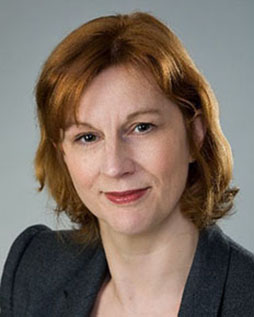
Kate Wright is the Academic Lead of the interdisciplinary research cluster in Media and Communications at the University of Edinburgh. Wright studies the practices and political economies of international news and mediated advocacy, especially humanitarian and human rights campaigning. Wright is currently working on a collaborative research project, in partnership with the UN-OCHA, to establish the influence of different kinds of digital media on the decision-making of major donor governments. This arose from a global research project, funded by the AHRC, on Humanitarian Journalism. In the course of this work, she studied major state-funded international broadcasters and wire agencies, as well as specialist outlets funded by private foundations.
DJRG fellowship accepted, rescheduled, dates T.B.D.
More about:
Wright have published sole-authored work on the growing involvement of NGOs in the production of international news, focusing on the coverage of Africa. As a result of this work, Wright has developed expertise in the politics of visual imagery, multimodal media analysis, and freelancing.
Before moving to Edinburgh, Wright was a Senior Lecturer in Journalism at the University of Roehampton, served as the Media Fellow on an ESRC project about Non-Governmental Public Action, based at LSE, and have been a Visiting Scholar at the ‘NODE Centre for Research into News and Opinion in the Digital Era’ based at Karlstad University in Sweden.
Wrights research interests have been shaped by experience as an award-winning BBC journalist working on Scottish, British and international news flagships. This included reporting on several wars, disasters and terrorist attacks, as well as investigative reports, which resulted in several murder convictions being overturned in the UK’s High Court.
Title and abstract
Digital humanitarianism, digital journalism
New forms of digital media are transforming humanitarian practice. Humanitarian needs are assessed using drone film, satellite imagery or digital ‘maps’ of disasters compiled from social media posts by distant volunteers. Refugees are visually tracked across borders using data drawn from their Google searches, and on arrival, they are often given access to wifi and mobile charging stations, along with food, water and shelter.
Potential humanitarian donors are increasingly encouraged to encounter, and learn from, “real” refugees via Virtual Reality, Augmented Reality, and humanitarian computer games. Indeed, even the evaluation of humanitarian missions or projects is carried out through digital media: with slick films and photo galleries increasingly supplementing – or even replacing- traditional staged assessments. Thus, this new world of digital humanitarianism brings together commercial media businesses, loose networks of skilled volunteers and freelancers, national governments, and humanitarian agencies in interesting— but often controversial— combinations.
New forms of digital media are also combining with other factors to transform the political economies of news outlets, as well as journalists’ practices and output. Digital media may give journalists new story-telling abilities, but it also creates a plethora of new pressures. These include (but are not limited to) the need to constantly reinvest in new technical developments, to chase fragmented and highly visual forms of audience attention, and to produce clickable, sharable content to demonstrate ‘success’ to advertisers and/or public bodies.
This paper aims to stimulate discussions about how digital media is reshaping the ways in which journalism and humanitarianism relate to one another: causing them to dovetail together in profound and complex ways. In the first part of the lecture, Dr Kate Wright will explain how the move towards digital media has reshaped the engagement of different NGOs in news production. To do so, she will draw on the production case studies contained in her book, Who’s Reporting Africa Now? Non-Governmental Organizations, Journalists and Multimedia¸ as well as her subsequent work on NGOs’ engagement in emerging digital media.
In the second part of the paper, Dr Wright will move on to discuss the findings of a collaborative 4 year project into humanitarian journalism more broadly. This project (which was funded by the UK’s Arts and Humanities Research Council), maps out which Anglophone news organisations in the world produce regular, original humanitarian coverage; the political economies underpinning such work; and the norms and practices involved in it.
Dr Wright will begin by outlining the imbrication of state-funded international humanitarian coverage in international diplomacy: focussing on the Chinese government’s efforts to exercise greater control over state-funded wire agencies and online media. She will then discuss specialist humanitarian journalists at the niche, online-only media outlets consumed by practitioners and policymakers. In particular, she will focus on the ways in which these journalists attempt to use the affordances of digital media to address their own goals, at the same time as try to meet the (ultimately unsustainable) requirements of the private foundations which fund them.
Selected publications
- Wright, K. (2019) ‘NGOs as news organizations.’ In H. Őrnebring and H. Wasserman (Eds.) Oxford Research Encyclopedia of Communication. Oxford: Oxford University Press.
- Wright, K (2018). “Helping our beneficiaries tell their own stories?” International aid agencies and the politics of voice in news production. Global Media and Communication 14(1): pp. 85-102.
- Wright, K. Scott, M. and Bunce, M. (2019) Foundation-funded journalism, philanthrocapitalism and tainted donors. Journalism Studies 20(5): 675-695.
- Scott, M. Bunce, M. and Wright, K. (2019) Foundation funding and the boundaries of journalism. Journalism Studies ONLINE FIRST: pp.1-19
- Bunce, M, Wright, K and Scott, M. (2018) “Our newsroom in the cloud”: Slack, virtual newsrooms and journalistic practice. New Media and Society 20(9): 3381-3399.